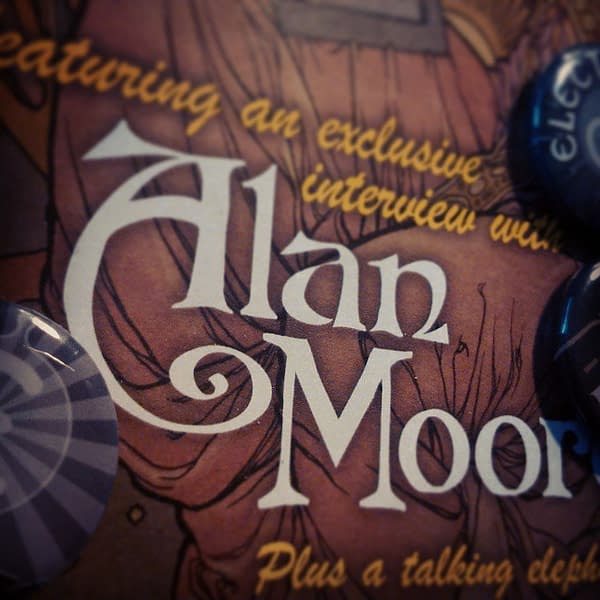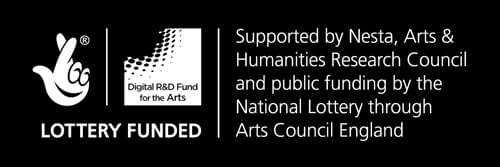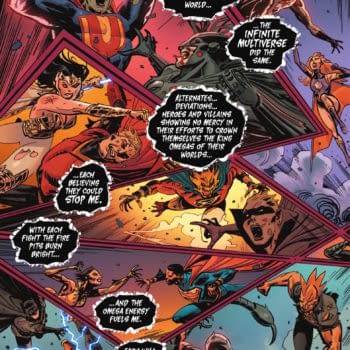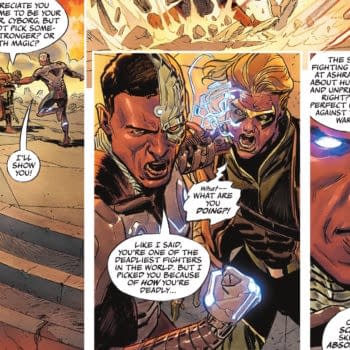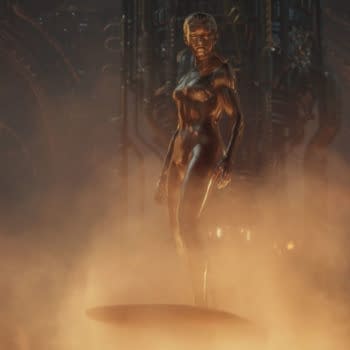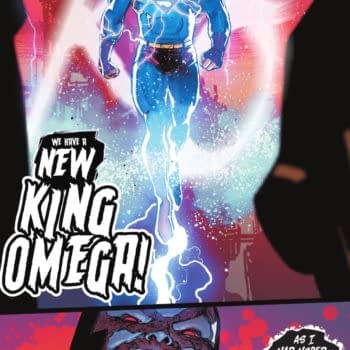Posted in: Comics, Recent Updates | Tagged: Alan Moore, Alison Gazzard, apps, Comics, creator-owned comics, Daniel Merlin Goodbrey, digital comics, electricomics, entertainment, leah moore, mitch jenkins, the show
Empowering Creators Through Electricomics – Mitch Jenkins In The Bleeding Cool Interview At Thought Bubble
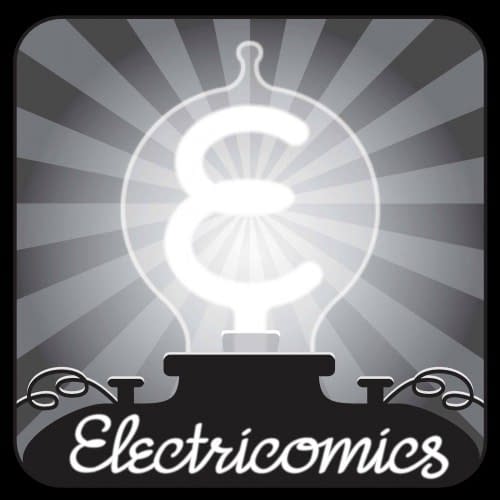
A number of team members were present at Thought Bubble in the UK in November, hosting an Electricomics table and panel at the show, and they kindly agreed to speak to me about the project, its perameters, implications, and goals. Last week, we ran Project Manager Leah Moore's interview on Electricomics, and this week we present our discussion with Mitch Jenkins, whose role as a "non-comics person" nevertheless supports many of the potential business aspects of the project, including the place of a new digital comics platform within creator-owned comics.
Hannah Means-Shannon: So, what was the beginning of this project for you?
Mitch Jenkins: The very beginning was when we got the original treatment for The Show. Alan was already talking about young people reading off the "spindle", which is a translucent flexible screen. And they were reading a new type of comic book. So, we had that in our minds and at some point we knew we were going to have to create this for the film. But we thought, "Let's try to create it early". Because we wanted to blur the lines between Alan's imagined world and the real world. So when you're watching the film, you think, "Hold on, does that exist? Oh, wait, I've seen it". So there is this complete blurring of things. And then I mentioned it to Pete Coogan, our producer, and he said, "Hold on. I know someone who designs apps". So we then sat down with Ed [Moore, no relation], from Ocasta Labs. It was at that point that he said, "There are government grants". So he went out and started looking for grants and found the academic team initially.
We started putting writers and creators and artists together. We then failed with the first hurdle. They felt that our academic offering wasn't good enough. We went away, met up with Alison [Gazzard] and Daniel [Merlin Goodbrey]. With Daniel's ten years of experience doing digital comics, we thought, "This is an ideal scenario". We reapplied, after being invited to apply by NESTA. Unluckily, we actually got the money (laughter). Which meant that we had to do something. That in itself was a bit of a shock to the system, because none of us had had any experience in setting something like this up. But like happy amateurs, we jumped in and put a meeting together, and decided we could make this work. We've had numerous meetings since to try to understand what digital comics are, what they could be, and what we want to get out of it. One of the main things is the toolkit that we want to create that could empower a new generation.
Rather than people thinking, "I want to be a comics creator", they could think, "I want to be a digital comics creator", because that doesn't exist as such. Primarily, if you look at a lot of people who work in this field, a lot of their stuff has just basically been digitizing existing material, which is pretty boring. And then Madefire do a really excellent job, but we felt a lot of their stuff just seemed to have bells and whistles for the sake of bells and whistles. They weren't necessarily exploring how you create a narrative using a digital space. Because it's a different way of telling a story. It's a 360 degree digital space. So that was one of our big challenges, finding a way of moving things forward without just chucking in sound effects for the sake of them. Are they necessary? How is it best to pursue this? So that's what we've been doing for the past few months, trying to tick as many boxes for our grant owners, NESTA, who have given us the cash. But more importantly, trying to find out how to move the project forward in a unique way. That's where we are at the moment.

HMS: What I find engaging is that you all are actually very open about what's going on as it's happening, like through the Electricomics blog and through social media. You have a meeting, and then you talk about it online. It's involving people even at the process stage.
MJ: Well, I think so. Because it is a government grant, I feel that it needs to be transparent. I've made this clear to everyone in the group, since I'm the non-comics person. I've said, "Guys, we just need to be honest and let people know that this is research and development. This isn't a commercial endeavor". It really isn't and I don't want anyone to think that it is. What we are really trying to do is find a way that's unique to tell stories in a digital space, provide academic data on the way this works and how the industry and the public will engage with it, which is really important, and provide this toolkit that will empower people. But if we fail along the way, we need to be open and honest about it so that people who then come behind us can see what we've done wrong, or what we've done right, and capitalize upon that. Or choose not to go down a particular road because we know it doesn't work.
I think that's going to enable the commercial sector to move forward, because at the end of the day, unless this becomes a commercially viable way of reading comics and interacting with the narrative, then we're all wasting our time. We have to find a way and encourage people to go out and do their own thing, because at the moment, if you've only got two or three people providing a digital platform, there's no competition there. There's no new talent emerging using those tools. It's just the people who have access to money, app designers, developers and commercial people. And not everyone does. So if we can create a toolkit that moves them along that line and empowers them to do so, but also tells them what works and what doesn't work, then hopefully we can expand the whole medium.
HMS: That's an interesting question, as to whether this is a genre of comics or a new medium beyond the standard medium of comics. It's comics, but depending on how far this goes based on what I've heard about interactivity, it could possibly even be its own medium of storytelling.
MJ: Well, I would hope that would be the case. But none of us really know for sure where it's going. If we can get this right, and that's still an "if", people may see it, and say, "Well, hold on, that's no different from anyone else's digital comic". And if that's the case, I really think we've failed.
HMS: Even if it became a commercial success, it wouldn't be an innovative success in that case.
MJ: Exactly! I think people need to really think about the digital space and how that story can be enhanced and told in a dynamic way, rather than just thinking, "Let's put a little sound on there. Or a little flick-page there". When people read a comic, there's music on in the background of some comics, and readers are hearing it in their heads. They already put in place the sound, and the tone of individuals speaking. There's a lot that goes on in an individual's head. We don't want to take that away from them, because we still feel that's an integral part of comics, but we're still trying to figure out this whole narrative and digital space. That's the challenge. So, if we can get that right, it'll all be good.
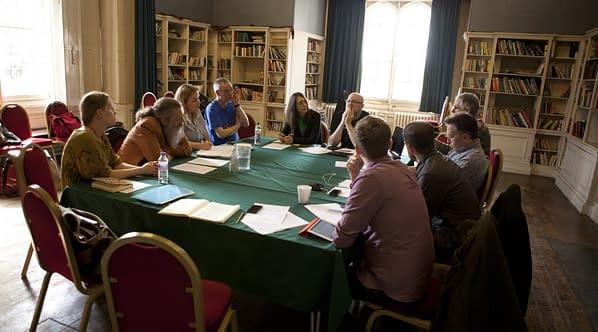
MJ: Well, that's definitely something that Daniel and Alison are bringing to it, with Daniel already having spent ten years studying the very inception of how people interact with digital and how people actually engage with it in a physical way. There are so many different elements. We've actually had hours and hours of discussion about how you actually interact and swipe. Asking, which is the best way, which is the most natural way, which is the most engaging way? Do we have loads of control panels actually on the screen? Is that going to destroy the illusion, or does it make it easier for you to navigate through a story?
It's taking hours and hours, weeks, months, just to figure out the best way to do it. It's like trying to re-invent something, or just invent something from scratch. Like I said, I have no idea whether we will be successful. I hope so. Ultimately, if we can empower this generation of young digital creatives and produce something that is commercially viable so that we can get to the next episode of our stories, then that will be a great success.
HMS: What sort of importance do you think there is in having a person on the team like yourself who is definitely not a comics person? What does that bring to the process?
MJ: In some ways, I genuinely don't know. I sometimes think when I'm there in the meetings, I feel I have no idea what's being talked about. But I think what I do is bring a bit more reality to it. I try to keep everyone from getting too excited. I say, "Guys, we really need to walk before we can run. We need to think about it".
HMS: Kind of as a counter-balance?
MJ: Yes, I tell them that we don't need to be jumping ahead. We've got to get it right and do everything at the right pace. And also keep an eye on the commercial factors. Like when we were doing our contracts, we re-wrote them because we initially had lawyers who produced, well, "draconian" isn't the right word, but something that wasn't artist-friendly. They were industry standard, but when we started reading them, we realized that wasn't what we wanted. We want all our creators to be empowered. We want them to have ownership and feel like they are part of something rather than just a gun for hire. I think that works.
I think if you collaborate with people, you want them to feel that they are all on the same team. What I've brought to things is trying to get everyone to understand that when we move into the commercial sector, we may have to start thinking about percentages and what's viable. Asking, if someone is investing money, are they going to get that money back? No one is going to take us on as a charity case.
There are people out there who will be happy to come onboard on the understanding that they are not going to be eviscerated financially. They may not want to make a lot of money. They may just want to be part of it, because it is just a really exciting project. But I also try to keep people on track with the idea that this is all just part of The Show as well. It all comes out of our feature film and the original project. So, for me, sometimes when everyone is getting really excited about Electricomics, I have to say, "Ok, it's brilliant. This is wonderful. But I'm still trying to do The Show".
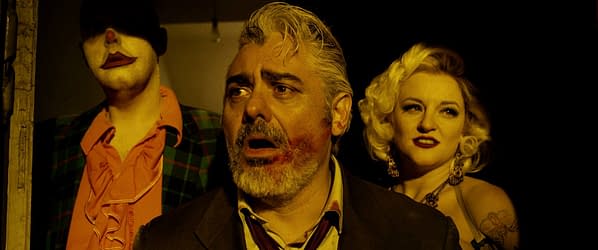
MJ: Exactly. There are so many other things that we are trying to bring into the real world like the fuel rods, the energy drinks, the escapism, the computer game. There are all of these different elements. I'm kind of dragged into different areas. I try to let them get on with it. I always go to the meetings, but I think I'm just that little guy sitting in the background saying, "Let's just calm down. Let's think about it. Let's just try to make it a reality and sustainable".
HMS: Acting as a parental figure? Like the grown-up?
MJ: Possibly, to an extent. Leah [Moore] is a rockstar. She's taken all this onboard. When we got the grant, a lot of people who had applied for the digital grant were already up and running as businesses, focusing on their one project. Whereas I'm focused on The Show and so many other things. When the actual grant came through, we had to build this foundation really quickly in comparison to everyone else. That's where Leah comes in. So, although I may be the grown-up in the room, she's the one with the brains.
HMS: Now, in your background, you're self-employed? You're a business owner and you have a number of years of experience in that, right?
MJ: Yes. I've been a self-employed photographer for twenty-odd years and I've been taking photographs for thirty. And then I've transformed into this multi-media individual working in trans-media and developing an understanding of that, because Alan and I have been working on The Show for about four years. In that time, I've been exposed to so many different variations of technology, and the art form, and exploring how we want to push it out in different ways. So, no longer am I just Mitch Jenkins, a photographer, but Mitch Jenkins, a director and a trans-media person.
We've run Orphans of the Storm, which is mine and Alan's arts group. Everything goes through Orphans of the Storm, hence Electricomics will be an Orphans of the Storm production, which is great. It's really about ensuring that both myself and Alan, as well as people who work with us, will get treated honestly and fairly, and be empowered as creators. So that they don't feel that they will be ripped off. We were offered a distribution deal with our film the other day, a major offer for someone to distribute and promote. I said, "That's wonderful!" And then they asked for 80%.
HMS: That is outrageous!
MJ: That's industry standard. So, they want 80% of something they've invested no money in. We've gone and gotten the money. We've created it.
HMS: It's not as if they filmed it for you or funded the filming of it.
MJ: Well, exactly. They didn't give us the money, and then recoup their money, and say, "We get 80% of the profits because we up-fronted everything". And that's the industry that we're dealing with. That's what Alan and myself just really don't want to get involved in.
HMS: When things are built organically, from the grassroots up, the big structure of filmmaking comes in and the two do not work together. The original structure is crushed.
MJ: And we're not happy with that. We just said to them, "Yeah, no thank you. Bye-bye".
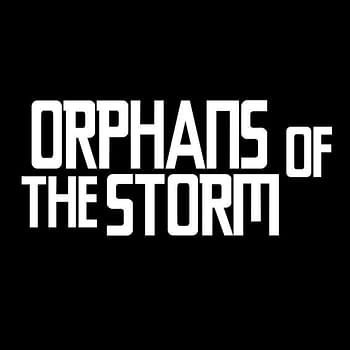
MJ: Oh, it is. But Alan and I spoke about it this morning. There are people out there who actually would do anything to get that recognition. They really, really would. They would take these terrible deals, and they would be ripped off left, right, and center. Alan and I are two middle-aged blokes living in Northampton.
HMS: You didn't just arrive.
MJ: Neither of us just arrived. I've said it in several meetings, much to the disdain of the people making offers, "We don't care. We really don't".
HMS: That must be almost incomprehensible to some people. They must stare at you blankly.
MJ: Well, they do. As Alan says, "The magic word is 'No'". And we say, "No", quite a lot. "No, we don't want to do that deal. No, that isn't right for us". People want editorial control of our project if they want to invest money. And the answer is, "No. We'll go somewhere else. We'll find money elsewhere and we'll do it our own way, even if it takes two or three years longer". And that's what we want to do with Electricomics and for the people who have come onboard. We just want everyone to feel they are a part of it. If it's a success, everyone gets their proper due, and everyone's happy. You get the best work from people that way. If people feel that they are being exploited, then they begrudge, whereas if they feel that they are empowered and part of a team, and they have a voice, that's different.
HMS: And if they feel their feedback is valuable…
MJ: Everything from them is valuable. I always work on the basis that any idea, I don't care where it comes from, if it's a good idea, it's a good idea. Ultimately I take all the credit (laughing), because I'm the director, joking, joking. But the truth is, unless you can give people a creative space to work in, with the power to fail, or just to feel that they are loved, and valued, then you don't get the best work. We are just getting all these really cool people onboard with Electricomics, and allowing them to fail if they do, succeed if they can, and we'll be there behind them.
HMS: You've answered a lot of my questions about what you bring to the table just through the process of this discussion, probably more than you think. It's clear that the breadth of your experience, of having been through the hard knocks of a fairly dog-eat-dog world as a self-employed person, are highly beneficial. There are a lot of younger creators, or newer creators, who might end up working with you all who don't have that level of experience. You're their line of defense.
MJ: Well, I would hope so. But I've seen Alan's original contracts for DC, and my God. I can understand, he wasn't reading them at the time, and he was just engulfed in that world, being given all these opportunities, but he didn't read the fine print. And that's much to his great regret, obviously. Whereas I've been very fortunate. He's never had an agent or a manager, whereas I've had agents, so every picture that I've ever taken, I still own all of the copyrights on. I've never, ever signed my copyright away.
People have lots of time to exploit things, and that's right and proper for anyone who invests, but the ownership of the intellectual property rights have always remained with me. For everything we've done with The Show, and the film so far, the rights aren't with Lex or with anyone else. They are with Orphans of the Storm. And that's something I've really brought to the table. It's making sure that everyone is secure in the knowledge that they aren't going to be taken advantage of.
HMS: So, Orphans of the Storm is a kind of secure zone for keeping IP with you all.
MJ: Yes. So, just imagine: If Electricomics became successful, and any of these characters were something that a third party wished to make a film of, using them, the creators would get the lion's share. Orphans of the Storm, because they've grown it and managed it, would have a percentage, as is normal business, but the creator would get the big chunk of change. It wouldn't be someone saying, "We own it. We'll give you five percent". It's the other way around.
HMS: You're the advocate.
MJ: Absolutely, and they should have it. If they've created it, they need to reap the rewards.
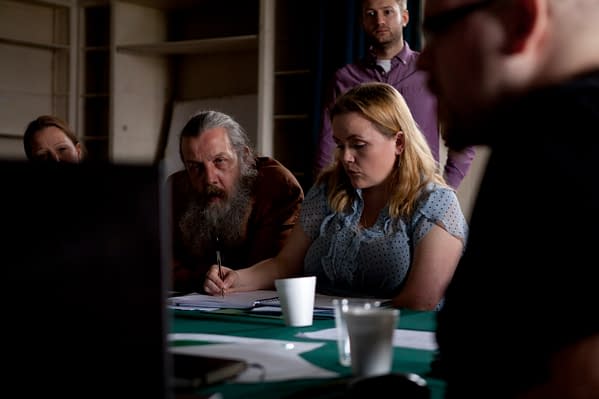
MJ: I think so, in a way. We would be the agents for them. We'd be ensuring they got their right percentages, and correct ownership. That's what I bring to things. I want everyone to get a fair crack.
HMS: This is a very salient conversation in the context of creator-owned comics. Mid-sized publishers who make sure creators retain their rights nevertheless struggle to keep a grip on things when it comes to movie deals. There are plenty of controversies about these things.
MJ: I don't see why there should be controversy. If a comic is successful, everyone's making money, everyone's getting their even split.
HMS: I think people just find themselves in that overexcited moment where they don't think clearly, as you mentioned before. Their reaction is, "Oh, it's so amazing that a film company is interested in this project".
Then there's that very dangerous moment of enthusiasm where someone might give up more than they should just to make that deal. It's human. Everyone is susceptible to that. So, they need someone who is cool-headed standing there saying, "Wait, wait. This is very important".
MJ: That's the one great thing about Alan. I've got a great deal of integrity, but Alan, his integrity is off the Richter Scale. He would never want anything like that to happen, and neither would I. I'm more of a realist and pragmatist than Alan, and I like to find that balance in between, but we do use the word "No" a lot. And if I felt one of our artists was about to get ripped off, I'd be using that word.
HMS: An intervention.
MJ: Absolutely.
You can learn more about NESTA and the digital arts fund by following them on Twitter @nesta_uk or the hashtag #artsdigital
Stay tuned on Bleeding Cool for an upcoming installment of our own Chris Thompson's Pop Culture Hound podcast featuring the Electricomics panel at Thought Bubble, and also for further interviews with the Electricomics team, including Daniel Merlin Goodbrey and Peter Hogan.


